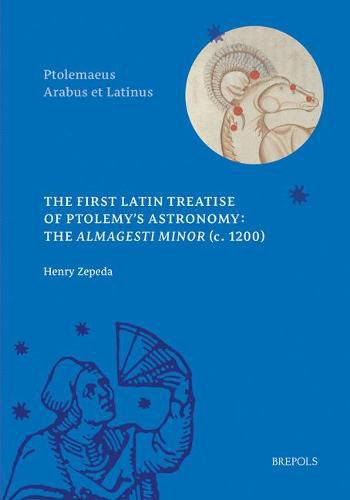Readings Newsletter
Become a Readings Member to make your shopping experience even easier.
Sign in or sign up for free!
You’re not far away from qualifying for FREE standard shipping within Australia
You’ve qualified for FREE standard shipping within Australia
The cart is loading…






The Almagesti minor is one of the most important works of medieval astronomy. The Almagesti minor, probably written in northern France circa 1200, is a Latin summary of the first six books of Ptolemy’s astronomical masterpiece, the Almagest. Also known to modern scholars as the Almagestum parvum, the Almagesti minor provides a clear example of how a medieval scholar understood Ptolemy’s authoritative writing on cosmology, spherical astronomy, solar theory, lunar theory, and eclipses. The author incorporated the findings of astronomers of the Islamic world, such as al-Battaanii, into the framework of Ptolemaic astronomy, and he altered the format and style of Ptolemy’s astronomy in order to make it accord with the author’s ideals of a mathematical science, which were primarily derived from Euclid’s Elements. The Almagesti minor had a profound effect upon astronomical writing throughout the 13th-15th centuries, including the work of Georg Peurbach and Johannes Regiomontanus. In this first volume of the Ptolemaeus Arabus et Latinus series, Henry Zepeda offers not only a critical edition of this little-studied text, but also a translation of it into English, analysis of both the text and its geometrical figures, and a thorough study of the work’s origins, sources, and long-lasting influence.
$9.00 standard shipping within Australia
FREE standard shipping within Australia for orders over $100.00
Express & International shipping calculated at checkout
The Almagesti minor is one of the most important works of medieval astronomy. The Almagesti minor, probably written in northern France circa 1200, is a Latin summary of the first six books of Ptolemy’s astronomical masterpiece, the Almagest. Also known to modern scholars as the Almagestum parvum, the Almagesti minor provides a clear example of how a medieval scholar understood Ptolemy’s authoritative writing on cosmology, spherical astronomy, solar theory, lunar theory, and eclipses. The author incorporated the findings of astronomers of the Islamic world, such as al-Battaanii, into the framework of Ptolemaic astronomy, and he altered the format and style of Ptolemy’s astronomy in order to make it accord with the author’s ideals of a mathematical science, which were primarily derived from Euclid’s Elements. The Almagesti minor had a profound effect upon astronomical writing throughout the 13th-15th centuries, including the work of Georg Peurbach and Johannes Regiomontanus. In this first volume of the Ptolemaeus Arabus et Latinus series, Henry Zepeda offers not only a critical edition of this little-studied text, but also a translation of it into English, analysis of both the text and its geometrical figures, and a thorough study of the work’s origins, sources, and long-lasting influence.